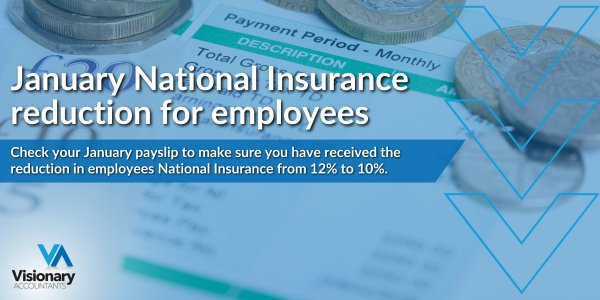Promoted by the government in the Autumn Statement as a ‘£1,000 yearly tax cut for households from today’, Employees' National Insurance Contribution percentages will be reduced for paydays on and after 06 January 2024. The touted £1,000 saving refers to a household that has two earners on the UK average wage of £35,400 per annum. Of course, not all households have two earners in receipt of two average salaries. However, if your payroll provider or Employer's software is not updated for paydays on and after 06 January 2024 there will be no saving at all!
In our News article of 22 November 2023, we relayed the Autumn Statement announcement that National Insurance Contributions (NICs) rates for employees will be reduced for paydays on and after 06 January 2024 and we are giving this reminder as it is vital that payroll software is updated.
The only thing that has changed is a reduction to the employee rate (from 12% to 10% (or 5.85 to 3.85 if the employee is paying at the reduced rate). Simple right? As ever, with tax and NIC changes, there is a sting in the tail.
What about Director Payrolls?
With regards to Directors, this is slightly different. There are two ways in which NICs can be calculated:
- Every pay period; if the Director is paid as if they were a ‘normal’ employee, i.e. a set amount every month. This is known as the 'alternative method', or
- Once annually; known as the 'annualised method'.
Regardless of how they are paid, they will have an annual earnings period rather than having NICs calculated based on the pay in the pay period. For Directors in tax year 2023/24, there is a ‘blended’ rate of 11.5%. This is calculated as:
- 9 tax months at 12% and
- 3 tax months at 10%
(the blended rate is 5.35% if the Director is eligible to pay at the reduced rate).
If the Director is paid via the alternative method, NICs will be calculated every time they are paid and will consider the rate change from 06 January 2024. Even so, there is still a requirement, when they are paid for the final time in that tax year, to do a reconciliation based on the annual earnings threshold rather than the one applied each time they are paid.
It is Directors that are paid once annually that may cause issues. HMRC have published their CA44 document which explains processing National Insurance for Director payrolls and covers the period 06 January 2023 to 05 April 2024. The advantage of using Visionary Accountants for your Payroll Services is that you don't need to read this 36 page document!
Either way though, it does not answer the following questions:
- What about a Director on an annual payroll that is due to be paid?
- What about a Director on an annual payroll that has already been paid? And
- What about a Director that has left?
The CA44 does not answer these questions; so we will.
Directors that are due to be paid annually?
If the director is due to be paid, for example in March 2024, you must ensure that your payroll system uses the blended rate for the payment (11.5% or 5.35% if the director can pay at the reduced rate of NICs).
Directors that have already been paid annually?
If the Director has already been paid annually, for example in December 2023, the NICs paid will have been calculated at the higher percentage. If they are still employed, they are due for a recalculation to consider the blended rate that applies for the whole of the tax year. However, Director payrolls that pay once annually are set at HMRC so that their systems only expect to receive one Full Payment Submission ('FPS') in the tax year. If they receive more than this, HMRC’s systems will change its filing expectation to monthly. If HMRC expect one every month but you are only sending one per year, HMRC will assume the FPS has been filed late with the knock-on effect that they will issue a late filing penalty notice. So, the following action is required:
- Recalculate the NICs giving the benefit of the blended (reduced) rate. This will result in a payment to the director and should be made through the payroll
- When the FPS is sent, ensure your payroll sends the field ‘Payment Date’ as the date the FPS was originally sent. So, if the recalculation is done in January but the December payment had a Payment Date of 31 December 2023, the January FPS must include this date as well
- Ensure the FPS for this employee is marked with the Late Reporting Reason ‘H’. This will tell HMRC’s systems that this is not another FPS but is a correction to one that has been sent before
Directors that have been paid annually but left the business?
If the director has been paid and has left, they will not have had the blended rate applied to their earnings. Yet, we are interested in what happened at the time of payment whilst they were still in employment / Directorship. There is no legal obligation to re-open the record of someone that has left. Providing their NICs were calculated based on the rates in force at the time of payment, you have no obligation to make any correction (as there is nothing to correct!).
It is the ones that have been paid and are still employed that are the issue.
And you thought payroll was simple!!
Correctly processing payroll and pensions is incredibly detailed and complex. It is very easy to get caught out with a mistake and end up in a horrific doom-loop with an uncaring HMRC helpline. So why not take the stress and worry out of the process by engaging the experts - Visionary Accountants - for all your payroll and pension needs?
